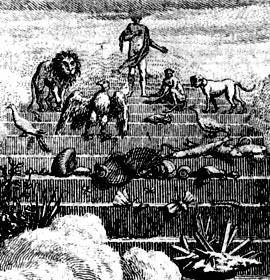


Thus, in describing the scala, the seventeenth century philosopher Gottfried Wilhelm Leibniz used many of the same terms (“chains,” “missing links,” “gradation,” …) later used in the context of neo-Darwinian theory: “All the different classes of beings which taken together make up the universe are, in the ideas of God who knows distinctly their essential gradations, only so many ordinates of a single curve so closely united that it would be impossible to place others betweenĪny two of them, since that would imply disorder and imperfection. To a great extent, the view of evolution expressed in the Origin is a temporalization of a previously static scala naturae,⁴ which is to say that it used the same sort of terminology and made many of the same assumptions, but placed the discussion in a temporal context. The scala naturae was long the dominant worldview of European thinkers."³ It was strongly associated with the ideas of divine order, perfection, continuity, and gradualism. He worries that in the end, only the lower creatures will have it right-they can't help but show some natural love for all of their kind, since they're all suffering together.The genera of things such a connection between the higher and the lower that they meet in a common point such an order obtains among species that the highest species of one genus coincides with the lowest of the next higher genus, in order that the universe may be one, perfect, continuous.² Our emperor grumbles about the lack of natural kinship between creatures of reason around him-perhaps because so many of his colleagues refuse to obey their directing minds. (9.9.2)īut not all is well on the scala in Marcus's day. Thus the upper reaches of the scale of being can effect fellow-feeling even when members are far apart. Marcus also sees this kindred feeling working at the highest rungs of the ladder, in the realm of the gods:Īmong yet higher things there exists sort of unity even at a distance, as with the stars.

Since he is more kin to the gods than to, say, a rock, he understands that he must "do the work of a man," which is to be morally upright and concerned for the health of the "city" (which can also mean the "world" or "universe) where he lives. Yet this structure makes it easy for Marcus to sketch out his duty and purpose in the universe. In the Lap of the Gods, But Sliding Down the Ladder For him, it's a hierarchical structure that strictly defines who is under the thumb of whom in the great scheme of things. So community for Marcus is not that warm, fuzzy sense of neighborhood that we have today. It has long been shown that we are born for community-or was it not clear that inferior creatures are made in the interest of the superior, and the superior in the interest of each other? But animate is superior to inanimate, and rational to the merely animate. Marcus brings the scala into his writing to flesh out the idea of community that is central to his thinking about humans' purpose on earth: It's pretty much equivalent to the Great Chain of Being you have heard about in your Shakespeare class. Marcus frequently uses the image of the scala naturae or "ladder of nature" to explain the relationship between all created things and their creator.


 0 kommentar(er)
0 kommentar(er)
